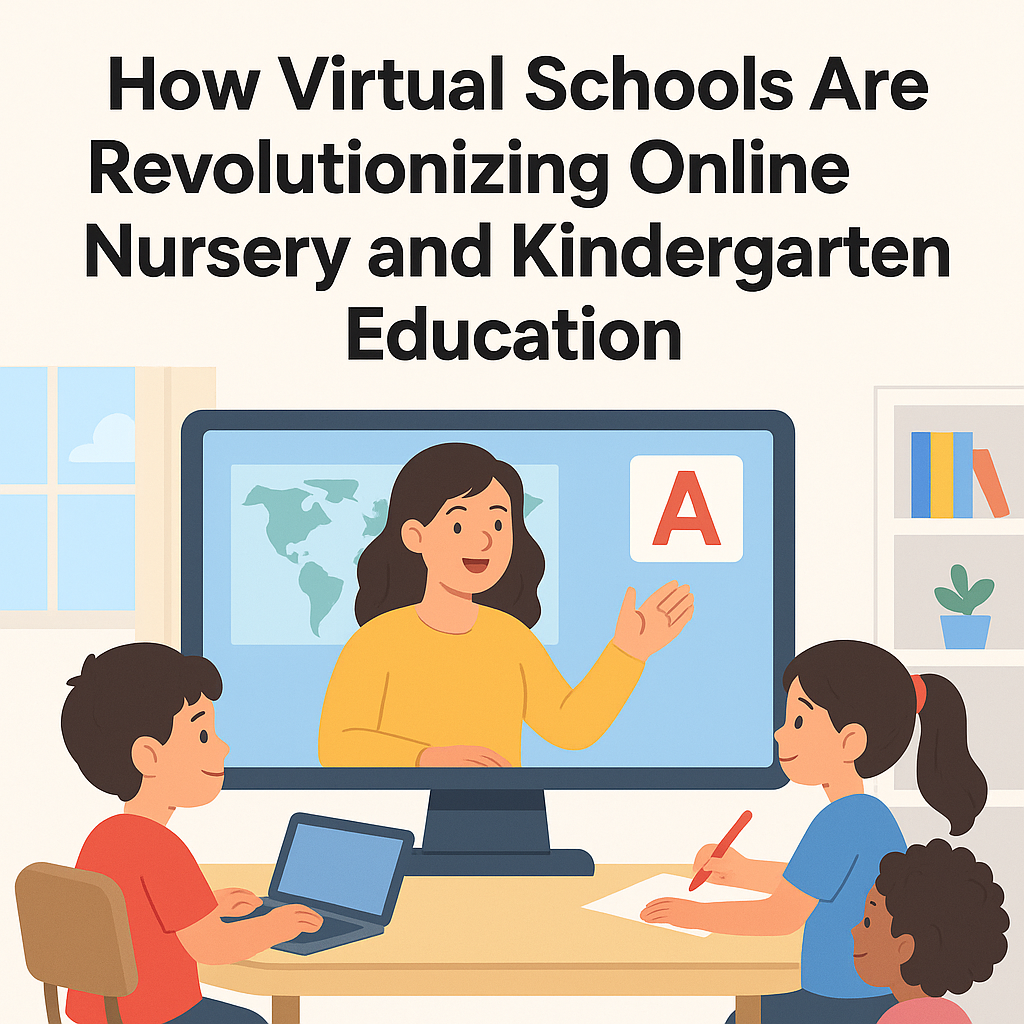Early childhood education lays the foundation for lifelong learning, creativity, and emotional development. With the rise of technology and increased access to the internet, virtual schools and online nursery programs have opened up a new era in early education. These digital platforms provide structured, engaging, and flexible learning environments where young children can learn from the comfort of their homes. The combination of interactive tools, a well-designed nursery curriculum, and skilled teachers is helping children build essential skills even before they step into traditional classrooms.
What Are Online Nursery Classes?
Online nursery classes are designed for children between the ages of three and five, offering a balance between play-based and structured learning. These programs use digital platforms to deliver lessons that include storytelling, music, art, and early literacy activities. The objective is to prepare children for formal schooling while nurturing their curiosity and creativity. Teachers conduct live virtual classes where children can interact, ask questions, and participate in fun, engaging tasks. Recorded sessions and learning materials are also provided so parents can reinforce lessons later.
Online nursery programs often follow a flexible schedule, making it convenient for working parents to manage their child’s education. The use of interactive videos, animated stories, and gamified learning ensures that children remain focused and enjoy every minute of their study time.
Benefits of Online Nursery and Kindergarten Programs
The advantages of online early learning extend far beyond flexibility. Here are some of the major benefits:
1. Flexible and Personalized Learning
Unlike traditional classrooms, online programs allow children to learn at their own pace. Parents can adjust schedules based on their child’s attention span, ensuring better focus and retention.
2. Interactive and Engaging Experience
The integration of colorful visuals, educational games, and songs keeps children entertained while they learn. This play-based approach helps develop fine motor skills, critical thinking, and creativity.
3. Access to Qualified Teachers
Virtual schools bring together experienced and trained educators from across the country. Children gain access to the best teaching talent without being limited by geography.
4. Safe and Comfortable Environment
Learning from home offers children a sense of security and comfort. It reduces anxiety, helps them adapt better to new concepts, and fosters a love for learning in a familiar environment.
5. Cost-Effective Education
Online nursery and kindergarten programs often cost less than traditional preschools, as there are no transportation, meal, or uniform expenses. Families can invest in learning materials and enrichment tools instead.
6. Parental Involvement
Parents have the opportunity to observe lessons, understand teaching methods, and participate in their child’s education. This involvement strengthens the parent-child bond and improves learning outcomes.
7. Early Technological Literacy
Children using digital tools for learning develop confidence in navigating technology. This early exposure helps them adapt easily to future digital learning platforms and modern educational systems.
The Role of Virtual Schools in Early Education
Virtual schools have redefined what early education looks like in the digital age. They provide a structured framework for online nursery classes and kindergarten programs that ensure children meet developmental milestones. These institutions implement comprehensive nursery curriculums that cover subjects such as language, mathematics, science, art, and emotional development.
AI-driven assessment tools in virtual schools analyze a child’s learning behavior and generate personalized progress reports. Teachers can then tailor lessons to focus on areas where a child might need additional support. The use of video conferencing, interactive whiteboards, and cloud-based assignments makes the online experience feel like a real classroom.
Virtual schools also promote social interaction through group activities and peer collaboration. Children learn teamwork, communication, and empathy—skills that are as important as academic learning.
How Parents Can Support Online Learning
Parents play an essential role in making online nursery and kindergarten education successful. Here are a few ways they can contribute:
- Create a Dedicated Learning Space: A quiet, well-lit area with minimal distractions helps children concentrate better.
- Maintain a Consistent Routine: Regular schedules help children understand structure and discipline.
- Participate in Activities: Engaging with your child during lessons or creative exercises can make learning more enjoyable.
- Encourage Breaks and Outdoor Play: Balance screen time with physical play to ensure holistic development.
- Communicate with Teachers: Regular updates and discussions with teachers help track progress and address concerns early.
The Future of Online Nursery Education
The future of early childhood education is likely to be a blend of traditional and virtual learning. Kindergarten online schools are already integrating technologies such as augmented reality (AR) and artificial intelligence (AI) to make learning more immersive and adaptive. As more parents recognize the benefits of online learning, the demand for quality virtual education will continue to grow.
Furthermore, online nursery programs can make education more inclusive by reaching children in remote or underserved areas. Every child, regardless of location, can now have access to top-quality early education.
Conclusion
The world of education is evolving rapidly, and virtual schools are leading this transformation. Through well-structured online nursery programs, engaging activities, and interactive curriculums, young learners can build strong academic and social foundations from an early age. Parents, teachers, and technology are coming together to make early education more enjoyable, flexible, and accessible than ever before. As innovation continues to shape online learning, virtual nursery and kindergarten education will undoubtedly become the new norm, empowering the next generation of confident, curious, and tech-savvy learners.
